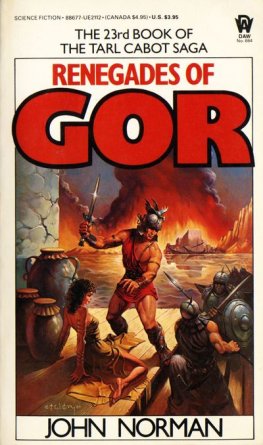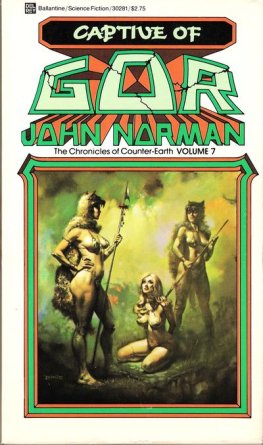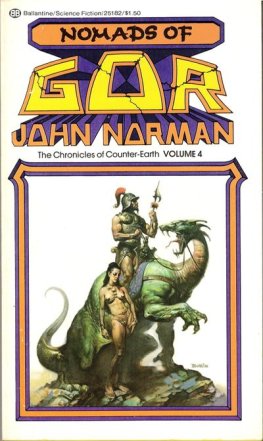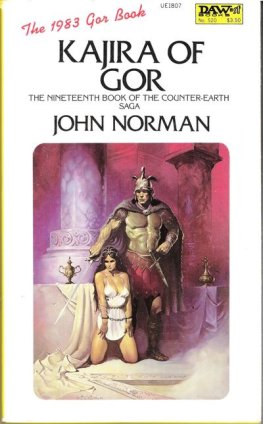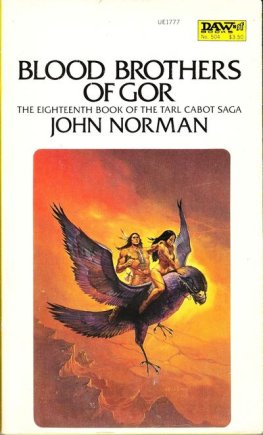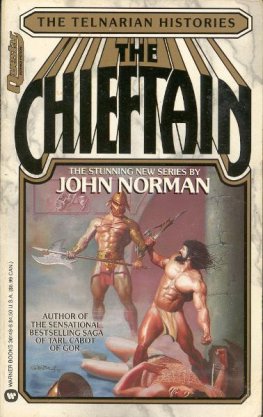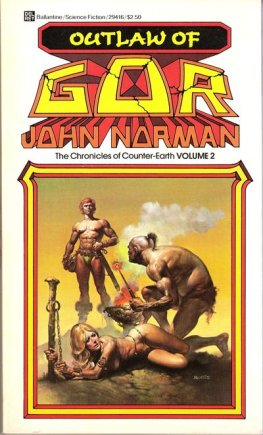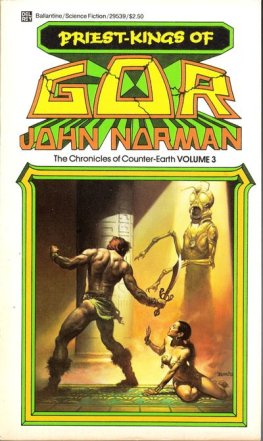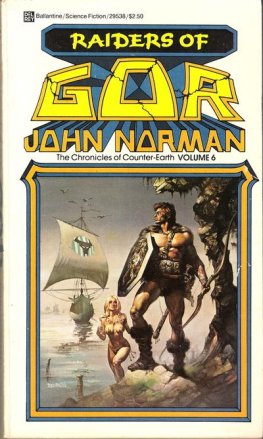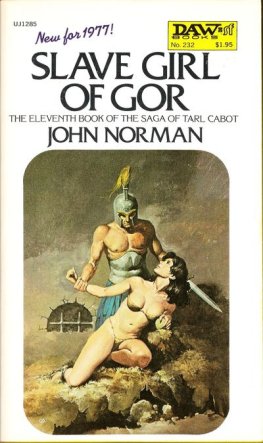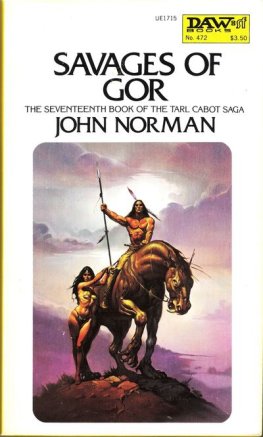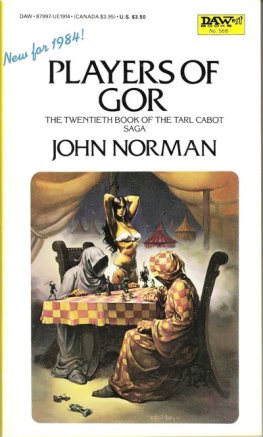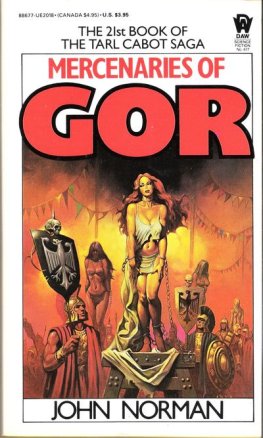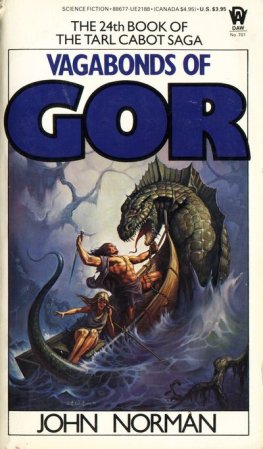RENEGADES OF GOR
(Volume twenty-three in the Chronicles of Counter-Earth)
by John Norman
In a sudden flash of lightning, showing the driving rain, the wagons, the crowd on the road, I saw ahead, above me, and to my left, about a half of a pasang forward, on its stony plateau, the inn of the Crooked Tarn.
"There is less than a pasang to go," said a man near me.
"They will have no places left," said another.
"You could not afford them, if they did," said the first man.
"We will camp on the lee side," said another, "and water the beasts in the moat."
"Wagons will already be circled there," said another.
When groups are traveling together the wagons are often arranged in a circle, end to end, tongues inward, narrowing gaps between the sections of the improvised rampart, and chained together, the front axle of the next, the camp, and the draft animals, and any accompanying livestock, within the circle. This forms a wagon fort or laager. The circle contains more interior space than any other geometrical figure, so the camp is thus as large as possible, given the number of wagons. Too, as every point on the circumference is normally visible from, and equidistant from, the center, this facilitates defense, for example, the prompt and pertinent deployment of reserves. This arrangement, incidentally, is not common with the southern wagon peoples, such as Tuchuks, if only because of the vast numbers of wagons. There the wagons congregate almost to form wagon cities. It is fairly typical, however, with some of the less numerous wagon peoples of the north, such as the tribes of the Alars, particularly when separated from one another on the march, though there one might note the circle is often very large and as many as four or five wagons deep.
There was another flash of lightning, and an earsplitting crash of thunder. Ahead, and on the plateau of the inn, I saw the large wooden sign, on its chains, jerked in the wind, striking about, pelted with rain. It was in the form of a malformed tarn, its neck crooked, almost vulturelike, the right leg, with its talons, much larger than the left, and outstretched, grasping. Such signs are not untypical of Gorean hostelries, as many Goreans, particularly those of the lower castes, cannot read.
Then again it seemed the world was plunged into darkness and there was little except driving rain and the creaking of wagons.
I had put my cloak over my head. The wagon I was walking beside was to my left. It kept to the left side of the road, as it was moving north on what, in this latitude, was usually called the Vosk Road, but farther south was generally knows as the Vitkel Aria. My cloak hung down from my head about my shoulders, and thence fell to my waist. I had shortened the straps of the sword sheath, hitching it high, the hilt now before my left shoulder, under the cloak. I kept one hand, from beneath my cloak, on the side of the wagon. In this way I was less likely to stumble in the darkness, and the cold, driving rain. The other hand, my right, held my cloak about my neck. My pack was in the wagon.
To my right, in the line of traffic moving south, I suddenly heard cursing and the startled, protesting bellowing of a tharlarion. There were shouts. There was a creaking of wood, and the slick squeak of an engaged, leather-lined brake shoe pressing against the iron rim of a wheel. "Jump!" cried someone. There was then a sound of sliding, and then, after a moment, that of a wagon tipping heavily into mud. The tharlarion, probably thrown from its feet, was squealing in its harness.
I pulled my pack from the wagon I was trekking beside and, feeling about, locating the side of the next wagon moving south, felt around it, and went to the side of the road. Another tharlarion moved past me. I reached out and felt its wet scales. In another flash of lightning I saw the wagon in the ditch, tipped on its side, its canvas-covered, roped-down load bulging against the restraining cover, the tharlarion also in its side, lying tangled in its harness, its feet flailing, its long neck craning about.
A man thrust past me, holding an unshuttered dark lantern beneath his cloak. Rain was pouring over the brim of his felt hat. Two others were behind him. They slipped down the side of the ditch. "The axle is broken," said one of the men to the driver. The driver had another fellow with him, too. I stood on the road, at its edge. I felt about with my foot. There were missing stones there. That was probably where the wheel had missed the road. There, I supposed, had loosened, given the heavy traffic and the storm. The wagon, it seemed, had slipped down the embankment, dragging the beast after it. I stayed where I was for a moment. It seemed to me odd that three men, one with a dark lantern, should be so quickly upon the scene.
"Beware," cried the driver through the rain to the men below me, beside the wagon. "I carry a Home Stone in this wagon."
The three men looked at one another, and then backed away. They would not choose to do business with one who carried a Home Stone, even though they were three to two. It was as I had speculated. There were road pirates. Possibly the stones had been deliberately loosened.
"Gentlemen," I called down to them. "Lift your lantern."
They looked upward. I let my cloak fall to the sides so that they could see the scarlet of my tunic.
"Hold your places!" I called.
They stood where they were. I might pursue one. None of them cared to risk being that one.
I slipped down the embankment to join them.
I tossed my pack to the side of the slope.
I took the lantern from the fellow in the broad-brimmed felt hat, and handed it to the fellow of the driver. I did not draw my sword. It was not necessary. "Unharness the tharlarion," I said to the driver. "Get it on its feet." He went around to the front of the wagon.
I took the leader of the three men in hand. "You have a wagon nearby," I said to him. "You two fetch it."
"It is not on the road," said one of the fellows.
I flung the leader to his belly in the mud and put my foot on his back. "Get the wagon!" he said.
They hurried away.
"Do you think they will return?" I asked.
He was silent.
I moved my foot to the back of his neck and pressed his face down into the muddy water. He pulled up, sputtering. "Yes!" he said. "Yes!"
He was correct. In a few Ehn the two fellows returned, leading a tharlarion drawing another wagon. As I had anticipated, it had not been far away.
"Empty your wagon out," I told the two. "And place the cargo of this wagon in what was once yours."
They did so. As I had anticipated the contents of their wagon was a miscellany of cheap loot, taken from other wagons, and from refugees moving south on the Viktel Aria, from the vicinity of Ar's Station, on the Vosk.
The driver, his tharlarion freed, and on its feet, hitched it before the other beast, in tandem. It knew his voice, and would respond more readily as the lead beast.
"Give your purses to the driver," I said.
They did so.
I myself took the contents of a metal coin box removed from their wagon and emptied it into my wallet. It contained several coins, the loot, probably, of better than several days' work. To be sure, most of the coins there were small, such as would be likely to weight only a threadbare purse. The number, however, more than compensated for the generally unimpressive denominations. There must have been the equivalent there of seventeen or eighteen silver tarsks.
I located the stones which were missing from the edge of the road. They were in the ditch below their place, half sunk in the mud. Apparently they had been removed deliberately from the road, and might be replaced, thence to be removed again, at will, to again jeopardize the integrity of the road, their absence in the darkness in effect, constituting a trap. The three fellows, with my encouragement, in the rain, replaced them.

